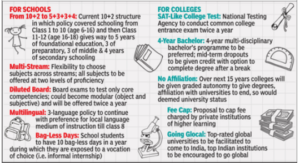In news- Recently, the Prime Minister addressed the nation on NEP-2020 first anniversary.
About National Education Policy (NEP), 2020-
The policy aims to transform India into a vibrant knowledge society and global knowledge superpower by making both school and college education more holistic, flexible, multidisciplinary, suited to 21st century needs and aimed at bringing out the unique capabilities of each student. Built on the foundational pillars of Access, Equity, Quality, Affordability and Accountability, this policy is aligned to the 2030 Agenda for Sustainable Development.

The special features of NEP 2020 includes:
- Ensuring Universal Access at all Levels of schooling from pre-primary school to Grade 12.
- Ensuring quality early childhood care and education for all children between 3-6 years.
- New Curricular and Pedagogical Structure (5+3+3+4).
- No hard separations between arts and sciences, between curricular and extracurricular activities, between vocational and academic streams.
- Establishing National Mission on Foundational Literacy and Numeracy.
- Emphasis on promoting multilingualism and Indian languages.
- The medium of instruction until at least Grade 5, but preferably till Grade 8 and beyond, will be the home language/mother tongue/local language/regional language.
- Board Exams on up to two occasions during any given school year, one main examination and one for improvement, if desired.
- Setting up of a new National Assessment Centre, PARAKH (Performance Assessment, Review, and Analysis of Knowledge for Holistic Development).
- Special emphasis given on Socially and Economically Disadvantaged Groups(SEDGs).
- A separate Gender Inclusion fund and Special Education Zones for disadvantaged regions and groups.
- Setting up of the State School Standards Authority (SSSA).
- Holistic Multidisciplinary Education with multiple entry/exit options.
- Establishment of Academic Bank of Credit.
- Setting up of Multidisciplinary Education and Research Universities (MERUs).
- Setting up of the National Research Foundation (NRF).
- Single overarching umbrella body for promotion of higher education sector including teacher education and excluding medical and legal education– the Higher Education Commission of India (HECI).
- Professional Education will be an integral part of the higher education system.
- Teacher Education – 4-year integrated stage-specific, subject- specific Bachelor of Education.
- Establishing a National Mission for Mentoring.
- Creation of an autonomous body, the National Educational Technology Forum (NETF) to provide a platform for the free exchange of ideas on the use of technology to enhance learning, assessment, planning, administration. Appropriate integration of technology into all levels of education.
Outcomes of NEP 2020-
- Universalization from ECCE to Secondary Education by 2030, aligning with SDG 4.
- Attaining Foundational Learning & Numeracy Skills through National Mission by 2025.
- To increase the public investment in the Education sector to reach 6% of GDP at the earliest.
- Increasing Gross Enrolment ratio (GER) in higher education to 50%.
- 100% GER in Pre-School to Secondary Level by 2030.
- Bring back 2 Cr Out of School Children.
- Inclusive & Equitable Education System by 2030.
- Board Exams to test core concepts and application of knowledge.
- Every Child will come out of School adept in at least one Skill.
- Common Standards of Learning in Public & Private Schools.
Previous Policies-
- In 1964, a 17-member Education Commission, headed by then UGC Chairperson D S Kothari, was constituted to draft a national and coordinated policy on education.
- Based on the suggestions of this Commission, Parliament passed the first education policy in 1968.
- The second one was the National Policy on Education of 1986, modified in 1992.
- A major development since the last Policy of 1986/92 has been the Right of Children to Free and Compulsory Education Act 2009 which laid down legal underpinnings for achieving universal elementary education.
















